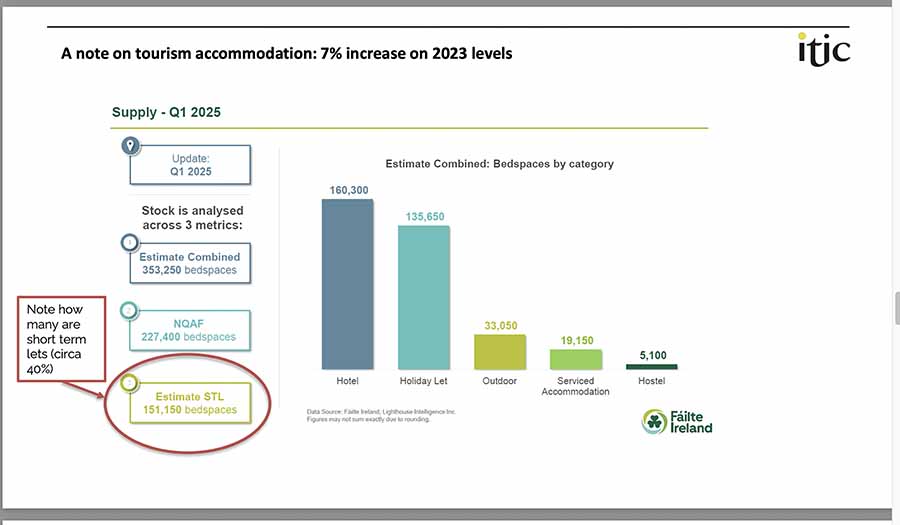
The Irish Self-Catering Federation (ISCF) is grappling with significant challenges as the Irish Government moves to extend Rent Pressure Zones (RPZs) across the entire country, a policy shift that threatens the viability of the short-term rental (STR) industry.
The expansion, announced on 10 June 2025, aims to bolster tenant protections but has sparked heated debate over its impact on tourism and small businesses, particularly those in rural areas reliant on self-catering accommodation.
RPZs, introduced in 2016 under the Planning and Development (Housing) and Residential Tenancies Act, restrict rent increases in areas with high housing demand and require STR operators to secure planning permission to operate legally. Initially confined to urban centres like Dublin, Cork, and Galway, RPZs now cover 76% of Ireland’s housing stock, including tourism hotspots such as Killarney and Kinsale. The latest proposal extends these controls nationwide, with a 2% rent cap for existing tenancies and inflation-linked caps for new builds, effective from 1 March 2026.
The ISCF, representing 6,000 holiday lets, has voiced alarm over the policy’s implications for its members, many of whom are micro-businesses or small and medium-sized enterprises (SMEs). Máire Ní Mhurchú, CEO of the ISCF, has urged members to “continue as normal” until the Government clarifies the legislation, cautioning against costly planning applications under current rules, which often result in refusals. “We’ve been waiting for planning guidelines for STR since January 2023, and so has the EU Commission. The homework hasn’t been done,” Ms Ní Mhurchú said in a recent statement.
The ISCF argues that RPZs, while designed to address the housing crisis, are a “blunt instrument” that stifles tourism, particularly along the Wild Atlantic Way, where self-catering accounts for over 50% of accommodation and supports an estimated €7 billion annually. A 2024 report by economist Jim Power, commissioned by the ISCF, warned of a €256.8 million threat to the regional economy if STR restrictions tighten further. Miss Ní Mhurchú highlighted the rural impact, stating, “Self-catering micro-businesses are the backbone of rural tourism, supporting local shops, restaurants, and activity providers. These regulations risk crumbling that ecosystem.”
The ISCF quotes an ESRI report which states self-catering did not cause the housing crisis. And argues that self-catering businesses, mostly run by women, face scape goating by new rental measures. Ms Ni Mhurchu shared: “The Minister for Housing seems to think Airbnb are the enemy – but like all OTA’s they own no property in Ireland. It is the women of Ireland who run the micro self-catering businesses all over the country who are being targeted. At the same time the Government is asking what more they can do to support Developers. The Government seems to be following the same plan as Spain has for tackling the housing crisis – without building houses.”
A written press release shared “the unintended consequences of placing all of Ireland in a Rent Pressure Zone has serious consequences for the self-catering sector. The Minister for Housing seems to think Airbnb are the enemy – but like all OTA’s they own no property in Ireland,” shared the press release author. It is the women of Ireland who run the micro self-catering businesses all over the country who are being targeted.”
‘Stabilising the rental market’
On the Government’s side, Minister for Housing Darragh O’Brien has defended the RPZ expansion as a necessary step to stabilise the rental market. A review of the rental sector, completed in 2024, acknowledged flaws in the current RPZ system but emphasised the need for balanced regulation to protect tenants while encouraging new housing supply. The Government has proposed a Secure Tenancy Affordable Rental (STAR) scheme to boost rental stock and allow landlords to reset rents to market rates between tenancies of at least six years, a move seen as a concession to property owners.
However, the ISCF contends that the policy fails to distinguish between long-term rentals and tourism-focused STRs. A 2023 press release from the Federation described the sector as “crumbling” due to RPZ legislation, noting that 13% of registered tourism beds are contracted to the State for long-term use, exacerbating the shortage of holiday accommodation. The Federation has long advocated for a national STR register, managed by Fáilte Ireland, to regulate the sector while preserving its economic contributions. Ms Ni Mhurchu said “A register would provide clarity and legitimacy, but RPZs are choking our industry before we get there.“
The debate has also drawn international attention, with the EU Commission pausing Ireland’s STR register plans until December 2023 to scrutinise RPZ compliance with EU trade rules. Fiona Campbell, a keynote speaker from the Association of Scotland’s Self-Caterers at the ISCF’s conference, warned of similar challenges abroad, urging Ireland to balance housing and tourism needs. “Legislation must be evidence-based, not knee-jerk, or you risk killing a vital industry,” she said.
‘De-stabliising the holiday homes market’
Derek Keogh chair of the Irish Self Catering Federation told Newstalk’s Antón Savage: When you look at it, STR is the global heading which they use, which is short-term rentals. When you actually break that down, it breaks down into many different components. So for example, the ones that particularly the government are targeting in relation to housing, we’re the ones in the city centre and there would also be your three-bed semi. And we thought we’re previously residential stock and have now gone into the short-term letting market. That is the targeted area and that’s where the focus of the government is on. With the issue that we have, we’re a self-catering organisation. We’ve been around long before rent pressure zones were ever set up. They were set up nine years ago. There’s many self-catering properties. I’ve been operating for 30, 40, 50 years. We’re like the modern day bed and breakfast in a sense and that we still meet and greet. We still actually welcome people onto the properties.
The positive side that we can look on this is now that people will actually realise that there is a difference between the various different type of cell short-term lets that are out there in the market. They’ll realise that if it’s a houseboat, if it’s a tree house, that all falls under the legislation. If it’s a farm house that wants to diversify the farm, that falls under the legislation. If you’re a self-catering property down in the country, if it’s let’s say your second holiday home that you bought back in the 1990s under Enda Kenny, when he was a Minister of Tourism was actually promoting these to regenerate tourism in the country. The focus, as I said, unfortunately on all this is on housing, it hasn’t been on tourism. We want to get it back onto tourism.
We’ have been screaming for the register for the last seven years. We’re totally 100% in favour of the register. The problem that we have with the legislation that was brought in, and this could have been brought in two years ago, is that it’s linked to planning, and it’s linked to DMZs, and in the short term, register.
First of all, we are all tax compliant, Airbnb, for example. If people use Airbnb, and Airbnb is only a sales tool for us. We are self-catering people. We provide a service on the ground. We are the housewives of the country. So that is what our product is. Airbnb just happens to be the net-eth in which they actually come to our property.
The vast majority of our members would not be compliant with the legislation as it stands as of today. If you just do a few sums on the back of an envelope, that’s worth 7 billion euros to the economy every year. If 50% of that is potentially exiting the market, that’s 3.5 billion a year that is going. In return, if you look at the houses that they’re targeting, they’re targeting the large urban areas. So really how many houses will they actually get back in areas outside of the four main cities? It is only a handful and if you multiply that out into the costs, it’s going to be ridiculous.
How long in place?
Taoiseach Micheál Martin has hinted at a potential policy shift, suggesting RPZs could be altered or abolished by the end of 2025, a move welcomed by the ISCF. “We need clarity on what’s proposed, as each county council interprets planning autonomously, creating unfair outcomes,” an ISCF spokesperson noted. However, with the Housing Agency’s review of RPZs due by March 2025, the sector remains in limbo.
Critics of the RPZ expansion, including the ISCF, argue it overlooks the sector’s sustainability credentials. A 2024 ISCF sustainability policy highlighted self-catering’s low environmental impact compared to hotels, with many operators retrofitting properties for energy efficiency. The Federation also points to STR’s role in supporting rural employment, with an Oxford Economics report estimating nearly 5,000 jobs tied to the sector.
As the Government prepares to finalise the legislation, the ISCF continues to lobby for exemptions or tailored regulations for tourism-focused STRs. “We’re not against regulation, but it must work for tourism towns and rural Ireland, not just urban housing,” Ní Mhurchú said. With the future of Ireland’s self-catering industry hanging in the balance, all eyes are on the upcoming review to determine whether compromise can be reached.
Ms Ni Mhurchu shared; “The unintended consequences of placing all of Ireland in a Rent Pressure Zone has serious consequences for the Self-catering sector. The Government plans to outlaw the Self-catering sector as a solution to the housing crisis.”





